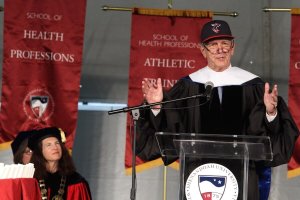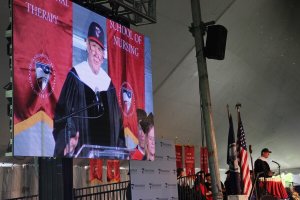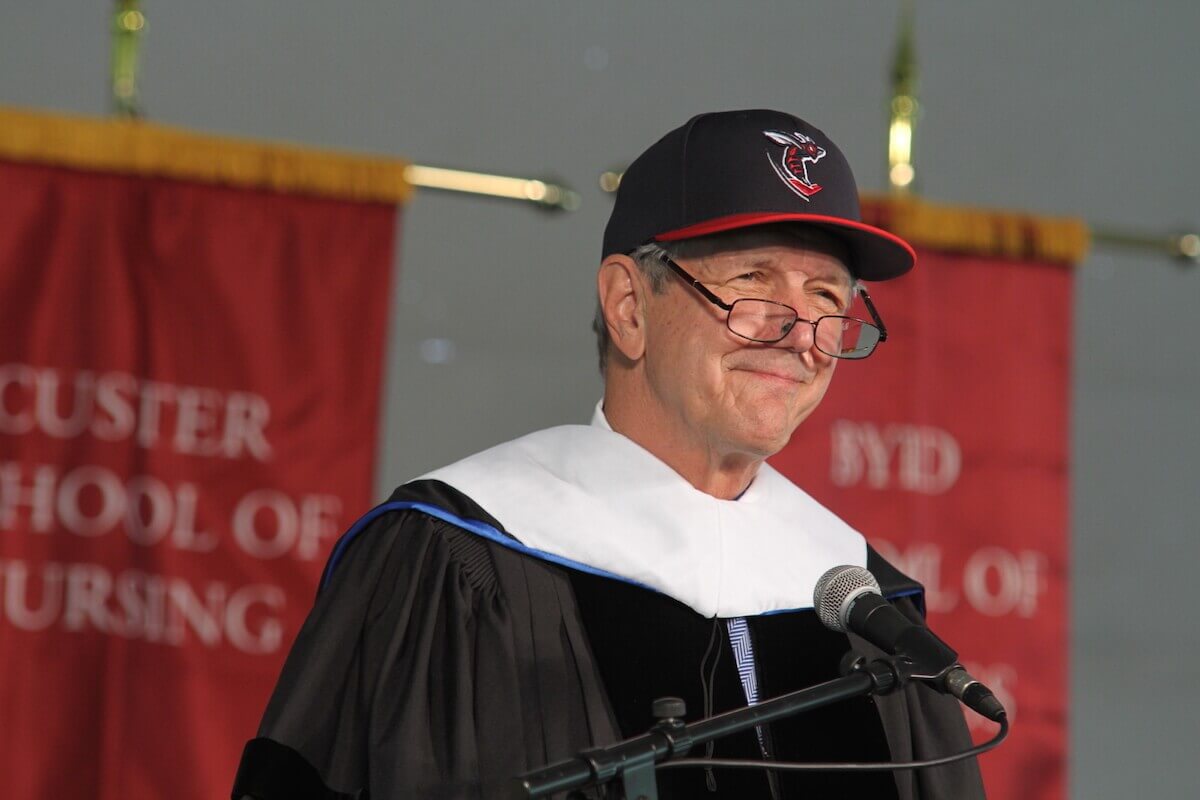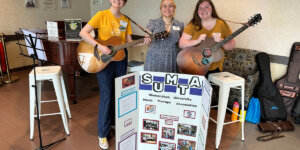On May 9, Charles Gibson, one of the preeminent broadcast television journalists of his time, delivered Shenandoah University’s 2015 Commencement address. He was also presented with an honorary Doctor of Humanities degree.
Here is the full text of Gibson’s speech:
They say that when you’re writing a speech, as I have been doing over recent weeks, that getting the first sentence down is the hardest. Well that’s now out of the way.
As you heard, for 19 years, I had a chance to host “Good Morning America” — the program that I think is the best named program in the history of television. And I want to tell you what an honor it was, for 19 years, every morning, to be able to say, “Good morning, America.” But because of the fortuitous timing of this graduation ceremony, I am able to say, “Good morning, Shenandoah.”
And I want to thank the university for granting me this honorary degree, but I have a confession to make. It is not my first. That came in 1965 at Princeton University when I was 22 years old. I’m not sure to this day why they graduated me. On my day of graduation, I was sitting among the summa cum laudes, the magna cum laudes, the cum laudes, and I was in a group that I heard a comedian once describe as the “oh thank you laudes.”
I barely made it, and as a result, I’m not entirely comfortable in this regalia. It just doesn’t seem to fit. So if you will pardon me for just a moment.
<Gibson takes off his doctoral tam and dons a Shenandoah Hornets baseball cap>
Much more comfortable.
 I am here to salute all of you, but also, to be completely honest, to salute my brother, Lang. He’s gone now. He was a builder and an architect, and many years ago, he moved to White Post, Virginia, just up the road on Route 50, to rebuild a barn in which he and his family would reside. And then he discovered that there was a magnificent music school nearby at Shenandoah. So before the final walls of his barn were finished, he hired a crane for a day to lift a grand piano made in 1904 into his huge — not as big as this tent, but huge — second floor living room.
I am here to salute all of you, but also, to be completely honest, to salute my brother, Lang. He’s gone now. He was a builder and an architect, and many years ago, he moved to White Post, Virginia, just up the road on Route 50, to rebuild a barn in which he and his family would reside. And then he discovered that there was a magnificent music school nearby at Shenandoah. So before the final walls of his barn were finished, he hired a crane for a day to lift a grand piano made in 1904 into his huge — not as big as this tent, but huge — second floor living room.
And he had this idea which came to fruition, to give neighborhood concerts — five or six a year — and he would invite some of your magnificent music faculty and some of your students to come and play for the people of White Post. And the entire range of White Post citizenry came. Everyone from the bank presidents to the people who delivered the mail. If you could have looked outside the barn on those evenings, you would have seen everything from Cadillacs to pick up trucks. You could not imagine a more democratic group.
Admission — it was a casserole, or dessert, or salad, for the potluck supper that followed the concert, and we would sit and we would listen to this incredible music. He loved this institution, and he loved those musicians. He thought there to be no greater gift in life than to be able to blend talents with others and jointly create something so beautiful, so majestic, so inspirational, that you could be brought to tears, as he often was.
My brother never had much money. When he was in his living room though, listening to those concerts, I have no doubt that he considered himself to be the richest man on Earth. And he was so pleased to watch this institution grow; to mature from its modest size as a college and conservatory when he first came to the area, to when you became a university in 1991, and now, he would be so pleased to see that you have grown to almost 4,000 students. Shenandoah is growing at an astonishing rate.
 There are signs of that phenomenal growth all over the place. I particularly like the “SU” logo that you have out there on the lawn. You know, that’s not something that could be done at Fordham University.
There are signs of that phenomenal growth all over the place. I particularly like the “SU” logo that you have out there on the lawn. You know, that’s not something that could be done at Fordham University.
It is generally accepted by those of us who are occasionally called upon to offer appropriate words at a graduation, that none of you will remember a single word I say, and that actually can be reassuring as you prepare a speech — doesn’t matter what you say, they won’t remember it. But I hope to be an exception, for I am going to tell you why you were here for the last four years. You may wonder why it took four years for someone to come and tell you why you were here, but hey, I wasn’t invited when you arrived — just as you leave. And I want to start with a question that is asked so often these days — is a four-year college education actually worth it? The answer is yes, it is — very much so, and it’s not even a subject for debate.
From a purely economic standpoint, the diploma you receive today has never been worth more. The Federal Reserve statistics show that a graduate of a four-year institution will earn $800,000 more in a lifetime than someone who doesn’t have that diploma. Even those who graduated in the depths of the economic downturn 2008 have an unemployment rate now of 3.4%, and it’s over 10% for those who just have a high school degree. The graduate of a four-year college in 2013 was making 98% more per hour in salary than someone who did not go to a four-year institution. That gap is growing year by year. So if there were more graduates of four-year colleges than our economy needed, as some argue, that gap would be shrinking, but it’s not, it’s growing.
But I would never make the argument that you should attend a university like Shenandoah simply for the economic benefits that will accrue — far from it. It’s a nice byproduct of your education, but it is not why you were here. And again, in a moment, I’m going to tell you why you were here. That’s in television what we call a tease. To get you to stay through the commercial. Or in this case, to keep you awake after what may have been a rowdy Friday night.
You may not be old enough to remember one of my favorite theologians, Father Guido Sarducci. He was not a real priest; as you may know, he was actually one of the original cast members of Saturday Night Live. And Father Sarducci, for a small fee, promised to give someone who did not graduate from college a 10-minute lecture, and contained in those 10 minutes, he claimed, to be everything that a real college graduate would remember from his classes five years after graduation. Economics — supply and demand. Spanish, “Como esta usted?” Theology, which was the good Father’s field — the answer to the question “Where is God?” “Everywhere.” “Why?” “Because He loves you.” For an extra five minutes, and, a slightly larger fee, Father Sarducci said he’d throw in law school.
But his point, in simplified terms, is that you were not here just to memorize all the specifics taught in Dr. Polite’s business classes, Sherry Rawls-Bryce’s nursing courses, or even Dr. Bousquet’s science studies. For as Albert Einstein once said, “Education is that which remains when one has forgotten everything he learned in school.”
So why were you here? Well here comes the topic sentence. You were here to answer some basic questions. Like: “Who am I?” “What kind of a person am I going to be?” “What are my ethics, my values, my moral code?” “Do I have a thirst for learning?”
One of the great values of a four-year, on campus education is that it is sort of a “halfway house to life.” The pressures that you’re going to feel over a lifetime, the pressures that will challenge the set of moral values that I hope you’ve developed as you matured here at Shenandoah, will start in earnest once you’re on your own, out of the halfway house. But all of you have had these four years to think about the basic questions. “Am I going to be an honest person?” “Will my first instinct be to do that which I know is right?” and “Will I respect the rights and dignity of others the way I want them to respect me?” You may think those are easy questions, but they are not. And I want all of you to be able to look in the mirror for the rest of your lives and be proud of what you see.
One of the most memorable sayings in my life that I’ve always tried to keep in mind as a journalist, but which I think applies to all professions, was the frontispiece of a book that was written by one of the giants of my profession and it said simply, “I’d know, that’s who’d know.” There will come times in your life where your morals, your personal code will be challenged. When the company, or firm or network for which you labor may ask you to sublimate your values for the good of the institution. Do so, and perhaps the world won’t notice. But you’ll know. That’s who’ll know.
And you don’t have to look very far to find examples. Regrettably, they’re in the news every day. A former governor of this great Commonwealth who was perhaps headed for national office, was recently convicted for taking more than $175,000 in gifts, loans and trips from a businessman. Employees of a great car company refused for years to acknowledge that their ignition systems were causing accidents and people were dying as a result. And cigarette companies? They continue to produce a product that for decades, they have known, is killing people. So how do those folks look themselves in the mirror? Where is their moral compass? And where is yours? You need to know that by now.
If Shenandoah has done its job, and I am confident that it has, you’re going do professors Polite, Rawls-Bryce, Bousquet and all the others who have been here to nurture you — you’re going to do them proud. For I’ll tell you a secret. All of your professors are invested in you. You are why they do what they do. They, and I, invite you now to have a lifelong love affair with your college. Give back to this institution, for it has given in considerable measure to you.
I am told about 550 of you will walk across the stage this morning, and probably well into the afternoon to receive diplomas. Today is the advent of 550 individual expeditions that will require stamina and moral courage, but which I am confident will take you to places beyond yourselves, where that moral code that I hope you have developed and refined here at Shenandoah, will stand you in good stead, and will give you the opportunity to live a good life and to be proud of yourselves, and to foster the common good.
So now I’ve told you why you were here. But I’m going to finish with a piece of advice, and if you don’t remember anything else from this address, I am confident you will remember this, because most people think it applies just to beer, but it doesn’t — it applies to many, many aspects of life. “Stay thirsty, my friends.”
Blessings, and Godspeed to all of you.




